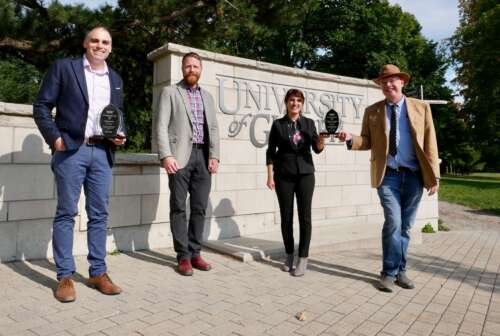
Two University of Guelph technologies being widely used to protect lives during COVID-19 and to preserve the environment will share the University’s Innovation of the Year Award for 2020.
When the pandemic began this year, food science professor Keith Warriner and post-doctoral researcher Mahdiyeh Hasani repurposed their food disinfection technology to clean N95 masks used in hospitals and care homes.
Commercialized by Clean Works Inc. in Beamsville, Ont., the process was approved by Health Canada and is now installed in hospitals across the country.
Prof. John Lindsay, Department of Geography, Environment and Geomatics, leads U of G’s Geomorphometry and Hydrogeomatics Research Group , which developed advanced geospatial data analysis software called Whitebox Tools.
The open-source technology is used around the world for applications that include wetlands mapping, landslide forecasting, soil erosion and ice cover modelling.
“The innovations we are honouring this year are the epitome of what the University of Guelph stands for,” said Malcolm Campbell, vice-president (research). “These are the types of innovations that have the potential to change our world and improve life.
“They aim to solve problems that impact people and communities everywhere, whether it is by ensuring a safe supply of protective masks and other personal protective equipment for our health care workers or creating a predictive tool with the potential to avert environmental degradation.”
Earlier, Warriner developed an oxidation process to inactivate microbes on foods and food packaging. Listening to a distraught nurse on the radio discussing the lack of protective equipment for health-care workers moved him to find a way to use his method to make PPE reusable.
“One of the biggest honours you can have is to see your research being put to use,” said Warriner, adding that receiving the innovation award marks his proudest moment in 20 years at U of G.
“We talk a lot about research grants and papers, but I think every researcher’s desire is that their research will make a difference. It is really good that this is helping us in the fight against COVID-19 and protecting front-line workers.”
Hasani said the project was her first experience of applying science to business. “I see this award as an acknowledgement from the University that I am an innovator in a field the University of Guelph is a world leader in,” she said.
Lindsay said Whitebox Tools has been downloaded by users in almost 900 cities in 116 countries, including 800 organizations and more than 120 universities.
“I always like to see the number of countries where it’s being used and enjoy hearing the different ways people are using it,” he said. “It’s very encouraging and one of the motivators for carrying on.”
Lindsay is now using the software to evaluate how vegetation and landscaping encroachment on sidewalks affects people with accessibility difficulties.
“This is the kind of thing that I can see having a direct impact on people’s lives.”
Contact:
Prof. Keith Warriner
kwarrine@uoguelph.ca
Prof. John Lindsay
jlindsay@uoguelph.ca
Full transcript.
Full transcript.